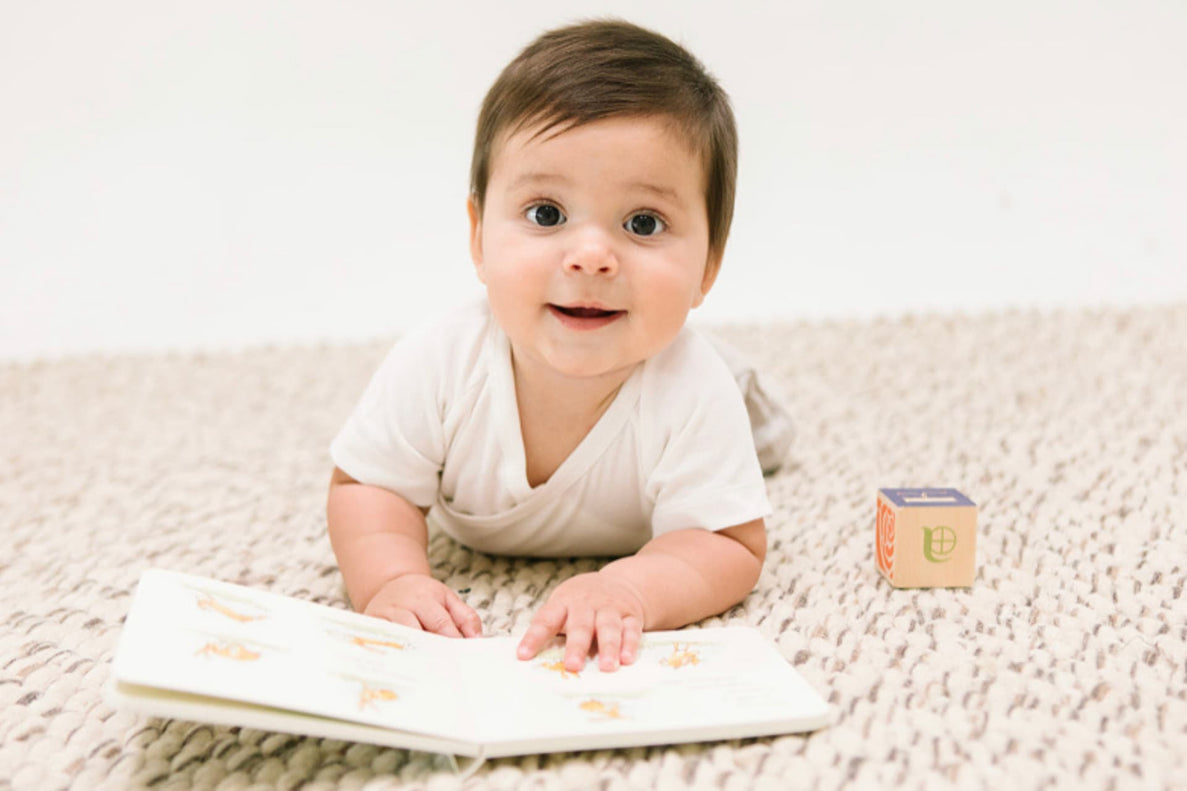Babies at 8-10 months are learning so many exciting new skills. Unfortunately, that can also come with some sleep struggles. You may have heard this called the 8, 9, or 10 month sleep regression. Let’s talk about it.
What is a sleep regression?
“Sleep regression” is a common phrase used to describe a temporary disruption in your child’s sleep, like waking more in the night, taking shorter naps, or fighting bedtime. This is common during times of developmental growth or big transitions (think: starting preschool or the birth of a sibling). Sleep can be impacted anytime your little one’s brain is busy focusing on physical, mental, social, or emotional growth.
Can I talk you through my approach to sleep regressions?
Are sleep regressions based in science?
When a baby’s brain is busy learning new things or developing, sleep can take a back seat.(6, 9) Also, as babies grow, their sleep needs change.(2,7,8) This means a baby may begin to struggle with more night wakings, with nap refusals, and with falling asleep. When sleep is interrupted this way, it can feel like everything is moving backwards, hence the term “sleep regression.”
However, sleep isn’t actually going backwards or permanently “regressing.” Sleep skills don’t just disappear at magical ages. When I talk about common sleep regression ages, I’m talking about ages when babies and toddlers often experience periods of development (physical, cognitive, social) or commonly have a change in sleep needs (Think fewer naps, more awake time, etc..). But truly, all babies develop at their own pace, meaning sleep could be interrupted because of new skills, cognitive progressions, or physical shifts at any age.
What are some signs of the 8-10 month sleep regression?
A sleep regression can look different for every baby depending on their personality and development. So how do you know if these new behaviors are a sign your baby is going through the 8-10 month sleep regression? Here are a few of the common signs parents experience:
-
Your 8 month old cries and becomes increasingly upset during her bedtime routine.
-
Your 9 month old is fussy all the time and won’t sleep unless you hold him.
-
Your 10 month old won’t nap or is taking a long time to settle down/fall asleep for naps.
-
Your 8 month old is starting to wake up every 2 hours at night when middle-of-the-night wakings weren't a problem before.
-
Your 9 month old cries every time you leave the room during naps or bedtime.
-
Your 10 month old’s naps are becoming shorter and/or more disrupted.
-
You’ve noticed a change in sleep patterns that simply feels “off.”
If you haven’t transitioned your 8, 9, or 10 month old to 2 naps a day, now would be the time to do this. It is possible, if your baby is still taking 3 naps, this could be the reason for the sleep issues you’re experiencing. If your baby is taking more than 2 naps because naps are short, it’s time to stretch those wake windows and drop a nap.
What causes the 8-10 month regression?
So much development happens during this time! There are major cognitive, emotional, and physical milestones that are typically reached between 8-10 months.
Around 8-10 months, your baby might be learning things like sitting up, crawling, pulling up, babbling, stacking, and more. He might also be learning the important idea of object permanence. Object permanence is the understanding that things exist when you can’t see them, which can lead to a surge of separation anxiety.
As your baby is learning these new skills, sleep can often be disrupted.
Teething could also be a culprit that is disrupting your baby’s sleep. If your baby is teething, we want to meet any physical needs while remaining as consistent as possible. If your little one needs some extra comfort for a night or two, this typically does not derail a solid sleep foundation. Having a strong sleep foundation before teething starts can make a big difference! If you are struggling with sleep, please know my 5–24 Month Collection can help.
Keep in mind that it’s normal to see an increase in distracted eating around 8-10 months, which can also affect sleep. So make sure your baby’s caloric needs are met during the day since it’s so important for consolidated night sleep.
Expert Tip: You may hear that a 4-hour feeding schedule is best at this age, but my recommendation is to continue to offer breast or bottle feedings every 2.5-3.5 hours according to your baby’s hunger cues.
Can you sleep train during the 8-10 month regression?
Yes, you can sleep train during the 8-10 month regression. It’s the perfect time for consistency to support healthy sleep. If you need help with sleep training, I have a class for you. In the 5–24 Month Collection, I’ll walk you step-by-by step through an emotionally-connected, holistic, and fully-customizable approach to sleep training. It also includes videos where I’ll give you practical guidance for regressions, transitions, and so many other sleep challenges.
How long does the 8-10 month sleep regression last?
Sleep regressions are temporary setbacks lasting from a few days to several weeks. How you respond to sleep struggles during this time can make a huge difference in minimizing the effects of a regression.
How can I help my 8, 9, or 10-month-old baby with the 8-10 month regression?
There are a few ways you can help:
Practice new skills during awake time.
Encourage lots of floor time so your little one can scoot, crawl, pull up, and stack toys. The more you practice during the day, the less exciting those skills seem when your baby needs to sleep.
Pay attention to bedtime.
With a baby who is on the move, it’s easy to miss those normal sleepy cues, but preventing overtiredness is still so important. Aim for about 3.5 hours of awake time before bed: age-appropriate wake windows will set your night up for success.
You'll also want to maintain a consistent bedtime routine to help prepare that active body for sleep.
Continue to prioritize restful daytime sleep.
So much is going on in your baby's brain right now, which means that naps and night sleep are both vital. A consistent (yet flexible) daily routine is important. If you're not sure where to start, I can help you create an age-appropriate sleep schedule for your baby.
Understand how your baby thinks.
Developing object permanence can often lead to separation anxiety. This can be hard for your mama or daddy heart, but this is actually a very positive developmental milestone for your 8, 9, or 10 month old! Check out this blog on separation anxiety for ideas on supporting your baby as they learn about object permanence.
Stay consistent.
Don’t start new habits or patterns that you don’t want to maintain. This regression may be tough for several days, but the more consistent you are, the more quickly it will pass.
If your nights and naps are rough beyond just a few days, I have a class for you.
The 5–24 Month Collection will give you a step-by-step plan for restful nights and solid naps through ALL regressions.
Read what parents are saying:








